| SHADOWS ON THE WALL | REVIEWS | NEWS | FESTIVAL | AWARDS | Q&A | ABOUT | TALKBACK | |||||
 Shadows off the beaten path Shadows off the beaten pathIndies, foreign, docs and shorts...
On this page:
ARE WE LOST FOREVER |
THE BLACKOUT: INVASION EARTH |
DNA
| |||||
| See also: SHADOWS FILM FESTIVAL | Last update 16.Jan.21 | |||||
|
Are We Lost Forever Review by Rich Cline | 
| |||||
 dir-scr David Fardmar prd Lis Svensson Brandberg, David Fardmar, Casper Andreas with Jonathan Andersson, Bjorn Elgerd, Micki Stoltt, Nemanja Stojanovic, Victor Ivan, Melker Wernberg, Michaela Thorsen, Shirin Golchin, Lisbeth Johansson, Maria Hedborg, William-Patrik Molven, Daniel Langelid release Swe Jan.20 gff, US 3.Nov.20, UK 22.Jan.21 20/Sweden 1h44 See also: 
Is it streaming? |
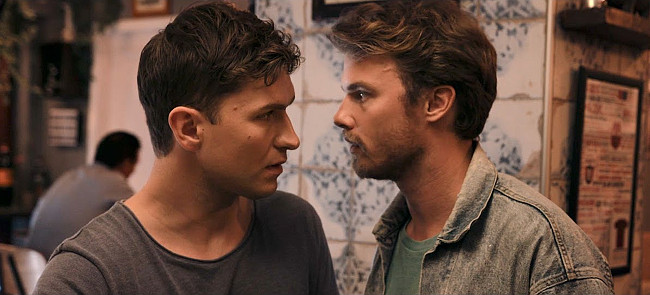 Swedish filmmaker David Fardmar and actors Jonathan Andersson and Bjorn Elgerd continue the story from their 2019 short No More We. This is an unusually honest exploration of a breakup, mixing a range of emotional reactions into scenes that resonate on several levels. It's such a stripped-down story that it might begin to feel a bit forensic as the months roll past, but it's packed with razor-sharp insight. When their relationship suddenly collapses, photographer Adrian (Elgerd) feels empty while musician Hampus (Andersson) is emotionally devastated. In pain, they still love each other deeply, but Hampus feels relief as he moves out. Later, Adrian reaches out hopefully, and they meet for an awkward coffee to work out what went wrong. Friends encourage them to move on, but they can't resist falling back into bed together. That feels like a mistake, but it raises the question of whether there's still a spark between them. Or maybe it's time to find someone new. Fardmar catches remarkable details in the minimalistic scenes, beautifully conveying the lingering affection that makes a breakup so disorienting. There are brief moments of lightness along the way, as well as a clever use of the characters' artistic skills in both Adrian's photo studio and Hampus' songwriting. The film is very cleverly designed, with some settings bright white and others drenched in dark colours. And while side roles make a strong impact, especially in the second half, the focus remains tight on the two centre figures. Elgerd and Andersson give staggeringly raw performances as young men trying to make sense of this conflicting collision of feelings. After three years together they know each other well, but they have contradictory perspectives on everything. The barriers between them are painful, and both actors cleverly underplay scenes to add simmering intensity even in moments that are otherwise relaxed and hopeful. And the more controlling Adrian takes all of this much harder than Hampus, which becomes difficult to watch. But then witnessing the disintegration of an already broken relationship is never easy. The way the film is written and played makes it impossible for the audience to take sides, except perhaps if there's a point of personal identification. Both of these men recognise the issues that scuppered their relationship, and they can't escape doubts about the reasons they split. Fardmar offers a provocative edge as these issues impact potential new connections. And he also reveals an unsentimental, positive future.
| ||||
|
The Blackout: Invasion Earth Review by Rich Cline | 
| |||||
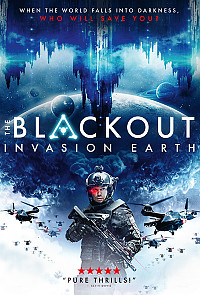 dir Egor Baranov scr Ilya Kulikov prd Valeriy Fedorovich, Evgeniy Nikishov, Egor Baranov with Aleksey Chadov, Pyotr Fyodorov, Svetlana Ivanova, Lukerya Ilyashenko, Kseniya Kutepova, Konstantin Lavronenko, Artyom Markaryan, Philipp Avdeev, Artyom Tkachenko, Ilya Volkov, Sergey Godin, Elena Koreneva release US Mar.19 cqsj, Rus 21.Nov.19, UK 28.Dec.20 19/Russia 2h07 Is it streaming? |
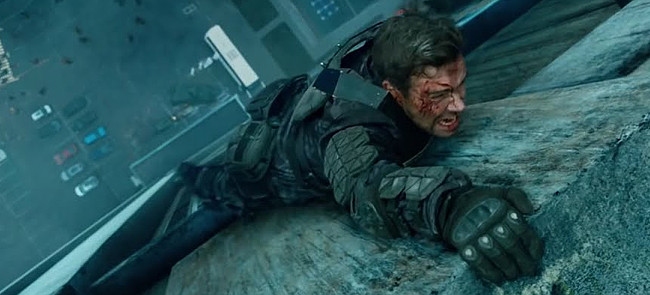 In the style of a videogame, this ambitious Russian sci-fi thriller centres on a the only region that survives a mysterious world-ending catastrophe. Solid effects and a watchable cast make this a guilty pleasure, although it's in need of tighter editing. There are some intriguing angles in the premise, and the elaborate story details offer some social commentary, but it begins to feel bombastic and indulgent as it goes on. In the relatively near future, an inexplicable massive blackout takes out the power around the world, leaving only a region in northeast Europe with electricity and communications. A reconnaissance mission from Moscow, led by Major Dolmatov (Lavronenko), discovers that everyone is dead in the dark zones except for people who somehow been given super strength. Months later, military leader Marina (Kutepova) oversees another mission to get more answers after an outpost is attacked. She's also been studying the supercharged people, and has begun to realise that they are connected to a much larger force. The story swirls around the usual random collection of disaster movie characters, including handsome soldier Oleg (Chadov), happy to discover that his girlfriend Alyona (Ilyashenko) is the doctor at an outlying base. Meanwhile, Oleg's swarthy friend Yura (Fyodorov) flirts with a journalist Olga (Ivanova), who's embedded with his unit. The film consists of a series of set-pieces, flickering back and forth between the soldiers on the frontline and the superpowered Sasha (Markaryan). He manages to summon telepathic alien leader Id (Tkachenko), who calls himself a god. The dialog is so blunt, and the interconnections between characters so cheesy, that there's not much an actor could do with this. But the cast members make the most of some earthy and comedic touches along the way, plus a bit of insinuating banter. It helps that Chadov and Fyodorov are beefy hero types, with Ilyashenko and Ivanova providing badly needed sparky-tough femininity. Everyone else is fairly growly and macho, including the Kutepova. So the conflicts between the characters have no real traction. There are some pointed thematic touches here and there, such as the way people begin rioting because they're sure the government is lying about the unfolding global situation. And the over-complicated explanation about what's happening notes that the human obsession with procreation and violence will lead to the planet's destruction. But most of this exposition is just fanboy-style blather. And frankly, the crazed attacks, massive shootouts and alien fistfights are a lot more entertaining.
| ||||
|
DNA ADN Review by Rich Cline | 
| |||||
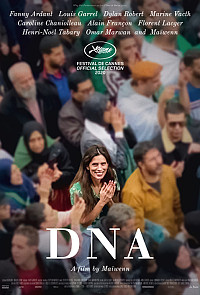 dir Maiwenn prd Pascal Caucheteux scr Maiwenn, Mathieu Demy with Maiwenn, Fanny Ardant, Louis Garrel, Dylan Robert, Marine Vacth, Caroline Chaniolleau, Alain Francon, Florent Lacger, Henri-Noel Tabary, Omar Marwan, Anne Berest, Lyes Salem release Fr 28.Oct.20, US/UK 26.Dec.20 20/France 1h31 CANNES FILM FEST Is it streaming? |
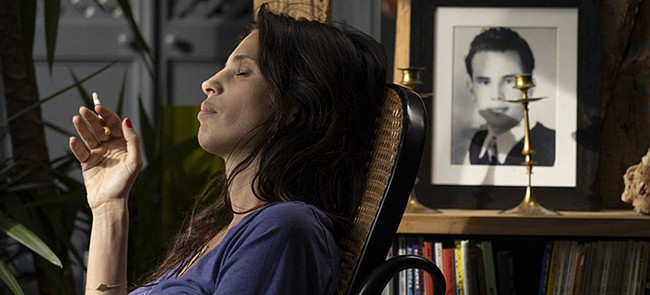 This documentary-style French drama takes a loose, meditative approach to personal identity through the eyes of actor-filmmaker Maiwenn. The story has an open emotionality that is instantly involving, capturing the close bonds of family connections as well as the silent impact of history and legacy. With dialog that feels improvised, the narrative is a bit meandering. But it's peppered with fascinating moments that bring the themes to life. As a book is published tracing the life of her grandfather (Marwan), Neige (Maiwenn) becomes newly intrigued by how he migrated from Algeria to France, met his wife and had two daughters, Caroline and Francoise (Ardant and Chaniolleau). Then when he dies, three grieving generations coming together to support each other and plan his funeral. Meanwhile, Neige begins to explore her North African roots, starting with a DNA test and an application for Algerian nationality. The test results reveal new information, leading to tough conversations with her mother Caroline and her estranged father Pierre (Francon). The film is intricately observed, without pushing any plot points or themes. Tiny family issues emerge along the way, from the financial strains on the younger generations to the way Caroline never looks natural in photos. It's not easy to work out how everyone is related, but the closeness is beautifully rendered without sentimentality, especially in their disagreements, such as when they loudly bicker about the funeral arrangements. And the depiction of grief is bracingly honest, as sadness mingles unexpectedly with humour, anger and waves of memories. Maiwenn's performance is easy and engaging. Neige is a woman whose love for her grandfather triggers a desire to understand herself more deeply, and her journey isn't what she expects. Ardant is wonderful as her diva-like mother, whose reactions are larger than life. Their big confrontation is provocatively moving. Francon also has a fascinating role as her relaxed, eccentric father. Garrel is terrific, as always, as Neige's straight-talking confidant. And in the earlier scenes, Robert creates a superbly vivid character, a lively young man who's particularly close to his grandfather. The complex layers of feelings in this film are remarkable, touching on a variety of aspects of what makes us human and connects us to each other. Maiwenn places bracingly strong moments throughout the story, which unfolds organically. And since it remains earthy and warm, the impact is unusually compelling. This isn't a momentous drama, but it's a quietly powerful exploration of the lingering impact of the people and places that make us who we are.
| ||||

See also: SHADOWS FILM FESTIVAL © 2021 by Rich Cline, Shadows
on the Wall
HOME | REVIEWS | NEWS | FESTIVAL | AWARDS
| Q&A | ABOUT | TALKBACK | | ||||

